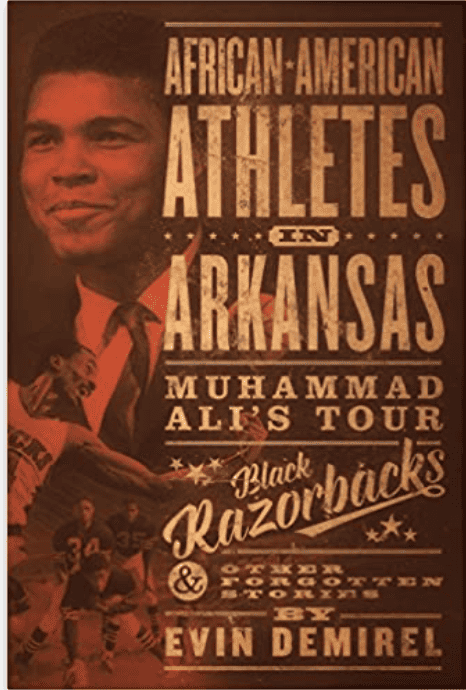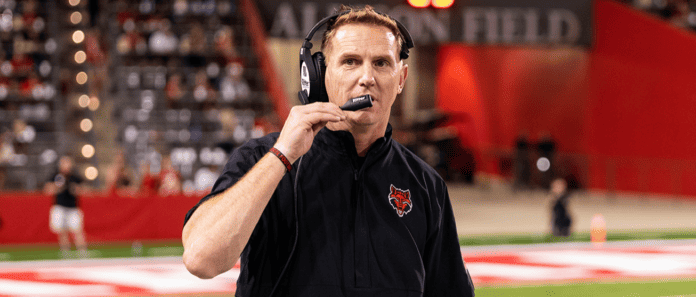The most intense college football drama in the state of Arkansas is happening in Jonesboro, where Blake Anderson is leaving after six years at the helm of the Arkansas State football program. The question of who will replace him, and if Barry Odom or Kendal Briles are among the top candidates, is one affecting Hogs and Red Wolves fans alike.
But that drama pales in comparison to the one that recently erupted at his new school, Utah State. Its football program announced its players are boycotting Saturday’s season finale against Colorado State because of concern over alleged religious bias by its athletic director, Noelle Crockett.
Utah State University has canceled Saturday’s football game with Colorado State University amid concerns voiced by @USUFootball players about religious discrimination during the search for a new football coach.
— Utah State University (@USUAggies) December 12, 2020
In a Zoom meeting on Tuesday between players, Cockett and the Utes’ athletic director, the players said Cockett voiced concern over interim head coach Frank Maile’s religious and cultural background. Maile, a Utah native, is a Mormon and Polynesian.
“The players were so ‘dumbfounded’ by Cockett’s comments that a player conducted an anonymous players-only survey asking teammates if they were on the call and whether they were concerned about anything they heard in the meeting,” according to reporter Brett McMurphy.
About three-fourths of the team that responded they were concerned about the religious bias against Maile by Cockett and that everyone should be treated with love, kindness and respect.
McMurphy, citing a player’ statement provided to his outlet, added: “It is not the first time issues of repeated discrimination have happened. In December 2019, our head equipment manager used a racial slur against one of our African-American teammates. After disregarding the incident, pressure resurfaced to investigate in the summer of 2020. After the investigation, the administration concluded he would continue to be employed.”
On Friday, the players unanimously voted to opt out of Saturday’s game “due to ongoing inequality and prejudicial issues between the players, coaches, and the USU administration.”
This is quite a situation for Anderson to enter.
It appears he is seeking a fresh start after going through the unimaginable grief of seeing his wife, Wendy, succumb to breast cancer and die in 2019. No doubt, it was hard to live in a place where he created so many memories with his beloved.
He indicated as much this past August:
As Blake Anderson leaves Arkansas State, all I can think about is this quote he gave me back in August before the season. Wishing him the best of luck and hope he finds what he’s looking for.
— George Stoia III (@GeorgeStoia) December 10, 2020
“Can I stay here and do this when everything in Jonesboro reminds me of Wendy?” https://t.co/9BNxseIGN2 pic.twitter.com/EcRYQXyCt1
***

***
Now it looks like Anderson, a devout Christian, will enter a situation in Utah State that is more stressful than he might have initially expected. He won’t need to just rehab the teams on-field product, but help restore its trust in the administration.
Fortunately, before he’s even officially announced as the school’s next head coach, Utah State players are already extending an olive branch: “We want our message to be clear that this has nothing to do with the hiring of Coach Blake Anderson, the recently-named head coach of the program,” they wrote in the statement.
“We are sure he is an excellent coach; we look forward to meeting him and his staff. We are highlighting the ongoing problems of inequality and want to create a better future for the community of Logan and Utah State University.”
Candidates for Next Arkansas State Football Coach
In a recent feature for The Athletic, national reporter Chris Vannini sells A-State’s facilities as the best in the Sun Belt, which is no small brag when one of the conference’s teams — Coastal Carolina — is the mid major darling of the college football world.
Since Anderson’s salary ($825,000) was third in the Sun Belt, it’s conceivable the next coach could command a salary in the million dollar range. Especially if it’s a splashy hire.
Either of Arkansas’ coordinators would qualify as that.
Barry Odom is less likely given he already makes $1.2 million a year and probably wouldn’t want to uproot after a single season unless it was for considerably more money and/or a head coaching job at a Power 5 school.
Plus, Arkansas State athletic director Terry Mohajir has a penchant for hiring offensive-minded head coaches.
That’s where speculation around Arkansas offensive coordinator Kendal Briles as a prospect comes in.
“The 38-year-old is already in the state and has a track record with explosive offenses at Baylor, FAU and Houston,” Vannini writes. “This year’s Razorback offense jumped from No. 110 in scoring to No. 66. But his time as an assistant coach at Baylor and the sexual assault scandal under his father [Art Briles] would certainly come up, as Kendal Briles’ name has appeared in various lawsuits surrounding that.”
Plus, Kendal Briles has jumped between programs so often in the last few years that it would be a bad look to leave so early again.
By sticking with the Hogs, he should have an outstanding chance to pad his resume in 2021 with the return of a talented offensive line, a dynamic dual-threat quarterback in KJ Jefferson and major threats in receiver Treylon Burks and tailback Trelon Smith.
The other top candidates Vannini lists are:
Jeff Lebby (Ole Miss offensive coordinator)
Phil Longo (North Carolina offensive coordinator)
Graham Harrell (USC offensive coordinator)
Bush Hamdan (Missouri QB/WRs coach)
Larry Fedora (Baylor offensive coordinator)
Brian Johnson (Florida offensive coordinator)
Keith Heckendorf (Arkansas State interim head coach)
Ryan Walters (Missouri defensive coordinator)
Vannini also lists Kane Wommack, a former Razorback fullback under Houston Nutt who is now a rising star as Indiana’s defensive coordinator.

***
This isn’t the first time players on a college football team have boycotted because of racial issues and the Mormon Church. But in 1969, Wyoming’s “Black 14” were protesting against the Mormons instead of siding with them. More about their story, which includes a Pine Bluff, Ark. native, starting on page 43 of my book:




